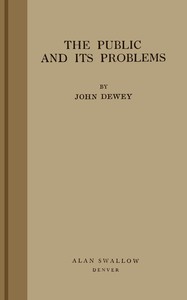The public and its problems by John Dewey
"The Public and Its Problems" by John Dewey is a work of political philosophy published in 1927. Responding to critics who dismissed democracy as unworkable in an increasingly complex modern world, Dewey defends democratic governance while acknowledging its flaws. He rejects rule by technocratic elites, arguing instead that democracy requires constant public engagement and vigilance to succeed. The book redefines what constitutes "the public" and "the state," exploring how genuine democracy can
survive amid twentieth-century technological and social transformations. (This is an automatically generated summary.)
Read or download for free
| Reading Options | Url | Size | |||
|---|---|---|---|---|---|
| Read now! | https://www.gutenberg.org/ebooks/71000.html.images | 412 kB | |||
| EPUB3 (E-readers incl. Send-to-Kindle) | https://www.gutenberg.org/ebooks/71000.epub3.images | 365 kB | |||
| EPUB (older E-readers) | https://www.gutenberg.org/ebooks/71000.epub.images | 362 kB | |||
| EPUB (no images, older E-readers) | https://www.gutenberg.org/ebooks/71000.epub.noimages | 234 kB | |||
| Kindle | https://www.gutenberg.org/ebooks/71000.kf8.images | 329 kB | |||
| older Kindles | https://www.gutenberg.org/ebooks/71000.kindle.images | 297 kB | |||
| Plain Text UTF-8 | https://www.gutenberg.org/ebooks/71000.txt.utf-8 | 359 kB | |||
| Download HTML (zip) | https://www.gutenberg.org/cache/epub/71000/pg71000-h.zip | 352 kB | |||
| There may be more files related to this item. | |||||
Similar Books
About this eBook
| Author | Dewey, John, 1859-1952 |
|---|---|
| Title | The public and its problems |
| Original Publication | United States: Alan Swallow, 1927, copyright 1954. |
| Note | Wikipedia page about this book: en.wikipedia.org/wiki/The_Public_and_Its_Problems |
| Note | "Result of lectures delivered during the month of January, nineteen hundred and twenty six, upon the Larwill Foundation of Kenyon College, Ohio." |
| Contents | Search for the public -- Discovery of the state -- The democratic state -- The eclipse of the public -- Search for the great community -- The problem of method. |
| Credits | Lukas Bystricky and the Online Distributed Proofreading Team at www.pgdp.net (This file was produced from images generously made available by The Internet Archive) |
| Reading Level | Reading ease score: 48.0 (College-level). Difficult to read. |
| Language | English |
| LoC Class | JC: Political science: Political theory |
| Subject | Democracy |
| Subject | Political science |
| Subject | State, The |
| Category | Text |
| EBook-No. | 71000 |
| Release Date | Jun 20, 2023 |
| Copyright Status | Public domain in the USA. |
| Downloads | 1533 downloads in the last 30 days. |
| Project Gutenberg eBooks are always free! | |

